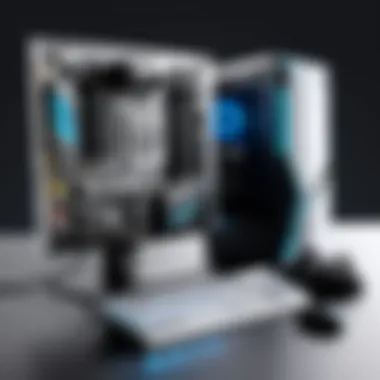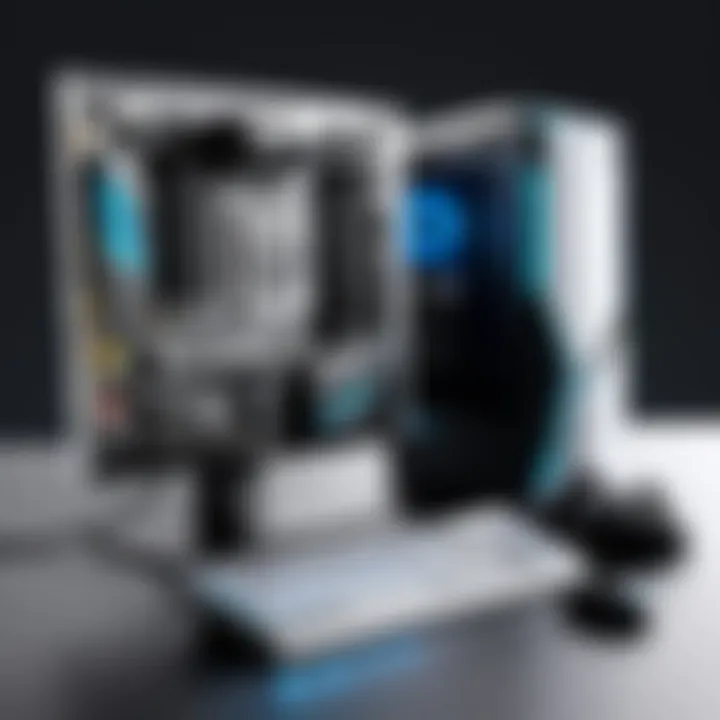Windows 10 vs Windows 11: Gaming Performance Insights


Intro
The gaming landscape has significantly evolved over the years, with operating systems playing a crucial role in shaping the gaming experience. Windows 10 and Windows 11, both offerings from Microsoft, present distinct capabilities and features that can cater to the diverse needs of gamers. Each system brings its own set of advantages and drawbacks, resulting in varying gaming experiences. To help users navigate through these differences, this analysis delves into the core features, performance metrics, and user interface of both Windows versions, enabling tech enthusiasts to choose the best fit for their gaming dynamics.
Understanding these variations is essential, particularly given that gaming demands increasingly robust performance and optimized systems. Are gamers likely to benefit from the cutting-edge innovations in Windows 11, or does Windows 10 satisfy most needs? We aim to answer these questions by juxtaposing the critical elements that affect gaming performance.
As we peel back the layers, let’s first explore what each operating system offers in terms of structure and functionality, as these elements deeply influence how games run and play.
Prologue to Windows Gaming
The gaming landscape has seen a radical transformation over the years, and at the heart of this evolution lies the Windows operating system. It is pivotal to understand how Windows has shaped the gaming experience, influencing the performance, accessibility, and features available to gamers. This section serves as a launching pad, highlighting the evolution of Windows in gaming and underscoring the significance of the operating system in ensuring a smooth gaming experience for users.
The Evolution of Windows in Gaming
Historical Background
When talking about the historical background of Windows in gaming, we need to take a stroll down memory lane to the time of MS-DOS, the forerunner that laid the groundwork for what we see today. The launch of Windows 3.0 in 1990 marked a significant turning point. Here, the graphical user interface started to make waves, making gaming a bit more accessible for the everyday user.
A key characteristic of this early phase was the limited hardware support, which made running games quite the challenge. Despite this, it was a crucial stepping stone, pushing developers to create titles that could work efficiently on these systems. For example, games like "Doom" and "Wolfenstein 3D" came alive on Windows, setting the stage for future innovations. The unique feature here was how Windows allowed multitasking, which changed the game for users, allowing them to run multiple applications while still enjoying their favorite titles, enhancing the overall gaming experience.
Beneath the surface, though, there were drawbacks. Early games often struggled with compatibility, relying heavily on the underlying DOS, which was not user-friendly for the average gamer. This complexity, however, spurred innovation and pushed Windows developers to refine their products further.
Key Milestones in Gaming on Windows
As we dive into key milestones in gaming on Windows, we can't overlook important releases like Windows 95, which brought along DirectX—a fundamental tool that significantly improved gaming performance on Windows PCs. DirectX allowed developers to harness the power of a computer's hardware effectively, bridging the gap between the software and the hardware, addressing compatibility issues that plagued earlier versions.
A defining feature of this milestone was the introduction of 3D graphics, which led to a surge in gaming titles that captivated a wider audience. Innovations like real-time rendering transformed the gaming experience, making it not just about objectives but also about vivid visuals. These advancements resulted in an explosion of creativity in game design.
However, not everything was smooth sailing. Some programs required continuous updates to keep up with hardware evolution, making gamers feel like they were stuck in an arms race. Nevertheless, these challenges only propelled Windows towards a more robust ecosystem for gaming.
Importance of Operating System in Gaming
Impact on Performance
The operating system has an undeniable say in how games run. Windows has evolved over time, focusing heavily on optimization and performance improvements. With each new version, we see enhancements that could make or break the gaming experience. The seamless integration of hardware, such as graphics cards, along with system resources, plays a crucial role.
One standout feature impacting performance is the Game Mode in Windows 10, which prioritizes gaming over other processes running in the background, potentially boosting frame rates and reducing lag. This focus on performance optimization can mean the difference between an average gaming experience and one that is truly thrilling.
It must be noted, though, that performance gains may vary based on individual systems and the types of games played. Certain high-demand titles may still struggle despite these advancements.
Compatibility with Games
Compatibility is another cornerstone in the realm of gaming on Windows. Over the years, Windows has become synonymous with gaming, partly due to its extensive library of available titles. However, the process has not been without hiccups. Games developed for older platforms sometimes provide a head-scratching experience on newer OS versions due to changes in architecture or performance optimization.
The ability to run legacy games can be a double-edged sword. While Windows has included backward compatibility features, the varying degrees of success in executing these functionalities have ignited discussions among gamers. This aspect keeps developers on their toes, ensuring that their latest titles remain playable, catering also to those who wish to revisit nostalgic favorites.
In summary, understanding the trajectory of Windows in gaming equips both developers and players with valuable insights, bridging the gap between history, performance, and compatibility, ultimately setting the stage for the comparative analysis of Windows 10 and Windows 11.
Overview of Windows for Gaming
Windows 10 has established itself as a sturdy foundation for gaming over the past several years. The operating system has been specifically designed with gamers in mind, marrying functionality with performance. As online gaming continues to thrive, Windows 10's role in optimizing the experience cannot be understated. This section delves into the nitty-gritty of what Windows 10 brings to the table for gamers, covering everything from system requirements to key features that enhance gameplay.
System Requirements
Minimum requirements
To run Windows 10, the minimum requirements stipulate certain hardware specifications. These include a processor of 1 GHz or higher, 1 GB of RAM for 32-bit, or 2 GB for 64-bit systems. Additionally, a DirectX 9 compatible graphics card is essential. These specs allow a wide range of computers to support the OS, making it accessible for many users. One significant characteristic of these minimum requirements is that they enable a broad spectrum of devices, from older PCs to budget options, to take part in gaming. However, this ensures only basic performance and can lead to a subpar gaming experience, especially with heavier titles. Windows 10 may run, but is slow and choppy, which is not a great experience for serious gamers.
Recommended specifications
On the other hand, the recommended specifications provide a more robust gaming environment. With a 1 GHz processor, 8 GB of RAM, and a DirectX 12 compatible graphics card, users can experience a significant boost in performance. Many gamers lean towards these specs for several reasons: they support the latest games, allow for smoother gameplay, and facilitate extensive multitasking. The unique feature here is the DirectX 12 compatibility, which opens the door to enhanced graphics and performance improvements. That said, the trade-off includes the necessity of investing in more powerful hardware, which may not be feasible for everyone.
Key Features for Gamers


Game Mode functionality
One of the standout features of Windows 10 is its Game Mode functionality. This feature allows users to allocate system resources to games, helping improve frame rates and reduce background interruptions. The ability to toggle Game Mode on and off is another hallmark, giving gamers control over how they want their system to perform when diving into a gaming session. This is beneficial as users can tailor their experience according to the demands of the game they are playing. However, the effectiveness can vary from one game to another, and some might find it doesn't significantly change their experience.
DirectX support
Supporting DirectX is another pivotal aspect of Windows 10. The OS's compatibility with DirectX 12 means that gamers can enjoy better graphics, improved audio, and overall enhanced performance. This level of support makes Windows 10 a popular choice among developers and gamers alike. The inclusion of exclusive features such as Resource Binding and Multi-Threading Rendering gives it an edge, especially for graphically-demanding titles. However, the caveat is that not all games are optimized to utilize the latest DirectX features, leaving some gamers wanting more from specific titles.
Performance Metrics
Benchmark results
When evaluating benchmark results, Windows 10 has consistently shown itself capable of handling demanding gaming tasks. Various performance tests indicate that the OS provides reliable frame rates across multiple titles, allowing gamers to enjoy experiences without significant lag. Key characteristics include its resource management efficiency and compatibility with a range of gaming hardware. These factors make it a preferred option for many serious gamers. Yet, it should be noted that performance can greatly depend on the specific hardware used, and results may vary across different machines.
User experiences
When it comes to user experiences, reports are largely positive. Gamers frequently comment on the seamless integration of the operating system with mainstream gaming platforms like Steam and Epic Games Store. The fluidity of downloads and user interfaces contributes positively to the gaming experience. However, some users have pointed out frustrations, especially around updates that can occasionally interrupt gameplay or cause performance dips. Finding this kind of balance can be challenging.
"Windows 10 strikes a solid balance between performance and accessibility for gamers, but it isn't without its hiccups!"
As technology evolves, understanding the strengths and weaknesses of Windows 10 will help gamers make informed choices about their setups. This background sets the stage for a direct comparison with Windows 11, assessing how the newer operating system stacks up against the legacy one.
Overview of Windows for Gaming
When it comes to gaming, the operating system can often be a game-changer. Windows 11 is a significant upgrade from its predecessor, offering an array of new features and enhancements. This overview serves as a comprehensive look at how Windows 11 specifically caters to gamers and the potential advantages it brings to the table.
System Requirements
Minimum requirements
The minimum system requirements for Windows 11 have raised eyebrows among gamers. While it aims to ensure smooth operation, these requirements can restrict users who may not be running the latest hardware. The most essential characterstic of these minimum specs is the need for TPM 2.0. This feature not only secures the system but also helps in performance during gaming sessions, making it a beneficial choice for newcomers to Windows 11.
One unique aspect is that the drive must support UEFI firmware, which can be a barrier for those with older systems. Still, it opens the door for innovations in gaming, such as faster boot times and improved load speeds. Overall, those meeting these minimum specs can experience a more secure, albeit locked-in, gaming environment.
Changes from Windows
The transition from Windows 10 to Windows 11 isn't just about a new layout or improved graphics. There are substantial changes in system requirements, which can determine if gamers can switch to the new platform. The key characteristic here is the shift to a more stringent hardware standard. Removing support for older CPUs, including many from the last few generations, eliminates hardware bottlenecks and promotes a smoother gaming experience.
While this change benefits those using modern architectures, it may alienate gamers clinging to older machines. An advantage is that this approach gives developers a more unified platform to design for, ensuring better performance across the board for those who invest in new hardware.
Innovative Gaming Features
DirectStorage technology
DirectStorage is one of the standout features of Windows 11, allowing for faster loading times and smoother gameplay. This technology significantly reduces loading times in games. The key characteristic of DirectStorage is its ability to bypass the CPU when loading textures, allowing games to access data directly from NVMe SSDs.
This capability translates into minutes saved, especially in vast open-world games with hefty textures, making it a popular choice for enthusiasts eager for efficiency. However, it does necessitate the use of top-tier storage solutions, which could be a risky investment for some users. Still, the advantages it presents make a compelling case for upgrading.
Auto HDR capabilities
Auto HDR is another innovative feature in Windows 11, enhancing the visual richness of games. With Auto HDR automatically applying high dynamic range to games that weren't previously designed for it, users can expect more vibrant visuals and improved light dynamics. The unique feature of this is its seamless integration with a wide range of titles.
As a beneficial option for gamers who may not have HDR-capable displays, it enhances the visual experience without requiring additional settings adjustments. On the downside, users without displays that support HDR will miss out on these enhancements, limiting its appeal but maximizing satisfaction for those equipped for it.
Performance Enhancements
Reported improvements
Reported improvements in Windows 11 show a tide of optimism among gamers. From smoother frame rates to reduced input lag, users have shared experiences that suggest overall enhancements. A compelling characteristic to note is how Microsoft has fine-tuned performance metrics based on player feedback. Games run better, loading times decrease, and the entire user interface feels more responsive.
This performance boost can be particularly advantageous in competitive gaming scenarios where every millisecond counts. Gamers have reported smoother gameplay primarily in resource-intensive titles, leading to a more immersive experience.
User feedback
User feedback plays a critical role in shaping the present and future of Windows 11 for gaming. Many players have observed significant gains in frame rates and stability, which is echoed across various platforms such as Reddit and gaming forums. One important takeaway is the diversity in experiences; while some users applaud the improvements, others raise concerns about unresolved bugs.


This characteristic highlights that while Windows 11 presents its set of advantages, expectations can vary widely. Understanding these nuances can guide gamers in evaluating whether to make the leap or hang onto Windows 10 a bit longer.
"Windows 11 isn't just a facelift; it’s more about what lies beneath the surface that can change the way we game."
In summary, Windows 11 brings a multitude of features and enhancements aimed specifically at improving the gaming experience. With changes to system requirements, innovative functionalities like DirectStorage and Auto HDR, along with performance enhancements, it offers an enticing package for the modern gamer.
Performance Comparison: Windows vs Windows
When it comes to gaming, the performance comparison between Windows 10 and Windows 11 cannot be brushed aside. Gaming isn't just about flashy graphics; it's also about how quickly you can get in the game and how smooth it feels while you're playing. Thus, the performance aspects touch on several key elements that gamers genuinely care about, such as load times, frame rates, stability, and compatibility. Understanding these differences will help potential users decide which system is their best bet for posterity.
Game Load Times
Analysis of loading speeds
Analysis of loading speeds focuses on how quickly games load into play. A delay in this phase can turn an exhilarating gaming session into an exercise in frustration. Both operating systems boast their take on speed; however, initial testing shows that Windows 11 tends to load certain titles faster than Windows 10. This can be attributed to improved resource management and optimization that Windows 11 brings to the table. Its quick load time is a serious perk for users who game frequently and value their time.
If you're eager to jump right into action, the faster load times can feel like a breath of fresh air compared to the occasional lag Windows 10 can throw your way.
DirectStorage impact
DirectStorage is one of Windows 11’s standout features that aims to reduce load times dramatically. This technology streamlines how data is transmitted from your storage to your GPU by allowing assets to load straight into the graphics memory without bogging down the CPU. Essentially, it saturates the bandwidth of NVMe SSDs to unleash the full potential of high-speed storage, ensuring games utilize their capabilities fully. In the world of gaming, where speed is key, this can make a world of difference. Users taking advantage of this technology often see significantly decreased loading durations, enriching their overall experience. On the flip side, one must also consider that not all games currently leverage this advantage, potentially leading to inconsistent experiences.
Frame Rate Performance
Benchmark comparisons
Benchmark comparisons illustrate how each operating system handles demanding games. Whether you’re playing a resource-heavy title like Cyberpunk 2077 or enjoying lighter fare like Stardew Valley, performance benchmarks shed light on how Windows 10 stacks up against Windows 11. Some users have reported modest to significant improvements in frame rates with Windows 11, particularly in titles optimized for the new system. This could mean smoother gameplay and an overall better experience for gamers, thanks to the enhanced capability of Windows 11.
Factors influencing frame rates
Factors influencing frame rates are multifaceted, extending beyond the OS itself. Hardware plays a crucial role—your graphics card, CPU, and RAM all contribute to the performance you can expect. Windows 11 incorporates technologies such as Auto HDR and DirectStorage that can lead to improved frame rates under certain conditions. However, it's important to recognize the variability between personal setups. Essentially, if you are using hardware from a few generations back, moving to Windows 11 may not yield noticeable benefits, and the impact may indeed vary widely.
Stability and Compatibility
Common issues reported
Common issues reported by users transitioning from Windows 10 to Windows 11 usually relate to compatibility with specific games or peripherals. Some gamers find their favorite titles experience stutters or crashes, bringing attention to the fact that every new OS iteration comes with its fair share of headaches. Windows 10 has built a solid rapport with a wide range of titles and equipment, while Windows 11 is still ironing out the kinks in its compatibility registry. Users must weigh the advantages of updated technology against potentially losing access to their cherished games or hardware.
Compatibility with legacy games
Compatibility with legacy games remains a pertinent topic. Many gamers have classics they still enjoy, and changes in the operating system can spark concerns about how those older titles will perform. Windows 10 generally runs legacy games like a charm, while Windows 11 occasionally has hiccups due to some unyielding coding from yesteryears. It’s crucial to understand that while Windows 11 is being designed with modern gaming in mind, some older titles might struggle, making Windows 10 a safer bet for those nostalgic nights spent gaming in the past.
In the world of gaming, the choice between Windows 10 and Windows 11 boils down to personal needs and hardware capabilities. Whether you prioritize speed with the latest features or value stability and compatibility with older games can guide your decision.
User Experience and Interface
The user experience and interface are pivotal when it comes to gaming on Windows platforms. Poor navigation or convoluted settings can be detrimental to gamers, who typically seek smooth, intuitive access to their games. Both Windows 10 and Windows 11 offer distinct interfaces and user experiences that cater to various gaming preferences. Understanding these nuances is essential for gamers wanting to optimize their setup.
Interface Changes
Comparative UI analysis
Windows 11 presents a refreshed user interface that emphasizes simplicity and accessibility. Compared to Windows 10, which maintained traditional desktop elements, Windows 11 adopts a more minimalistic approach. The Taskbar, for example, is centered, streamlining how users launch applications and manage their open windows. This revamped layout also means gamers can quickly find their games without combing through layers of menus.
A standout feature is the new Direct Storage interface that allows for enhanced loading times and smoother gameplay transitions. This design caters to a more seamless user interaction, solidifying Windows 11's appeal for gamers. However, the shift might pose a learning curve for longtime Windows 10 users, who may find comfort in the older layout.
Impact on gaming navigation
The changes in Windows 11's interface significantly impact gaming navigation. With an updated Start Menu that showcases pinned games and apps more prominently, gamers can access their favorite titles just a click away. Furthermore, its search functionality is sharpened, making finding specific game files or settings easier than before.
Windows 11 organizes game-related settings more intuitively within the system settings, making it quicker for users to adjust configurations on-the-fly. However, it is essential to consider that some users might miss the granular controls that were easily accessible in Windows 10. That said, the overall refinement in navigation is a considerable upgrade, particularly for newer gamers who value immediate access to their gaming ecosystem.
Community Feedback
User discussions
Community discussions surrounding Windows 10 and Windows 11 have been buzzing across platforms like Reddit, with gamers sharing experiences and preferences based on the respective operating systems. The common sentiment often focuses on performance and stability. Windows 11, with its focus on gaming-centric features, has garnered praise, but it is also met with valid concerns regarding hardware requirements. Some users express nostalgia for Windows 10's familiarity, advocating for its straightforward navigation over the newer system's aesthetic tweaks.


The interaction found in these discussions guides future updates and feature enhancements, as manufacturers often monitor community sentiment to align with user expectations.
Influence on gaming preferences
The influence of the operating system interface extends into gamers’ preferences. Many gamers value a responsive and engaging user interface, as this impacts their overall gaming experience. Windows 11’s modernized look, with rounded corners and updated icons, makes it a stylistically pleasing option, especially for those who appreciate aesthetics alongside performance.
The ability to integrate with Xbox Game Pass directly in Windows 11 has also swayed preferences, as this seamlessly enhances the gaming experience by offering a more extensive library of games. However, this very integration may lead some traditionalists to feel alienated, as it reorients their established gaming routines.
It's evident that the ongoing discussions surrounding user experiences and preferences will continue to shape ways both operating systems evolve. Engaging with the community and being open to change are fundamental for gamers aiming to optimize their platform choice.
Culmination: Making the Right Choice for Gaming
Selecting the right operating system can truly make all the difference for gamers. Windows 10 and Windows 11 each have their own set of attributes that cater to different preferences and playstyles. In this analysis, we’ve explored the ins and outs of each system, laying bare how they skirmish in the arena of gaming performance and usability.
One significant element is the performance highlights. Windows 11 brings some cutting-edge optimizations, which might sway gamers looking for the latest technological edge. On the other hand, Windows 10 boasts a tried and true framework that many gamers are already comfortable with. Thus, the decision ultimately hinges on a gamer’s specific needs and hardware capabilities.
When it comes to features, Windows 11 shines with its innovative gaming functionalities like DirectStorage and Auto HDR, enhancing the visual and loading performance significantly. Yet, for those who prioritize a stable and familiar gaming environment without the need for the latest and greatest, Windows 10 remains a solid option. It's like picking between a brand new suit or your favorite, well-worn jeans; each has its own allure depending on the occasion.
Summarizing Key Differences
Performance highlights
In terms of performance, Windows 11 has taken notable leaps. With faster load times, thanks to technologies such as DirectStorage, gamers could see gameplay that flows smoother than a well-oiled machine. The key characteristic here is the efficiency that comes with this new architecture; loading heavy games can become just a routine task. While Windows 10 performs admirably, making it a common favorite among gamers, the enhancements in Windows 11 provide a more refreshing experience.
Pros:
- Improved loading times: Games load significantly faster.
- Better resource management: This platform optimizes system resources effectively.
Cons:
- Hardware demands: To reap its benefits, newer hardware is typically essential.
Feature comparisons
When we shift focus to features, the introduction of DirectStorage in Windows 11 is game-changing. This functionality directly communicates with your storage solutions, reducing loading bottlenecks. Windows 10, while capable, lacks some of these innovative features, which gives Windows 11 the upper hand in terms of appealing functionalities.
Pros:
- Innovative gaming features: Capabilities improve overall visuals and performance.
- Future-proofing: Windows 11 is designed for upcoming technologies.
Cons:
- Learning curve: Users need time to adapt to the new environment.
Future of Gaming on Windows
Predicted trends
Looking into the crystal ball, the future of gaming on Windows looks promising. As more games incorporate features like DirectStorage and Auto HDR, gamers will likely see these advancements solidify Windows 11's position in the gaming arena. The key trait here is adaptability; the gaming landscape is ever-evolving, and Windows 11 aims to keep pace with emerging technologies.
Pros:
- Long-term viability: Keeping updated with trends ensures better experiences.
- Expanding gaming horizons: Emerging technologies will offer new ways to engage with games.
Cons:
- Possible obsolescence for older systems: Users on Windows 10 may miss out.
Windows updates and support
Finally, Windows updates and support present yet another crucial facet in making a decision. With Windows 11, Microsoft has committed to rolling out regular feature updates and security patches, ensuring a safer and more responsive environment for gamers. The system itself has a dynamic framework, which allows for real-time enhancements based on user feedback, making it a more adaptable choice for the future.
Pros:
- Regular support: Consistent updates keep the system fresh.
- Improved security: Safeguards against potential threats are more robust.
Cons:
- Bloating issues: Frequent updates may sometimes add unnecessary overhead.
Ultimately, your choice between Windows 10 and Windows 11 should reflect your gaming preferences, hardware compatibilities, and what you expect from your gaming experiences. Every gamer has their own taste, and one operating system might shine brighter for one than the other. Your ideal platform awaits!



